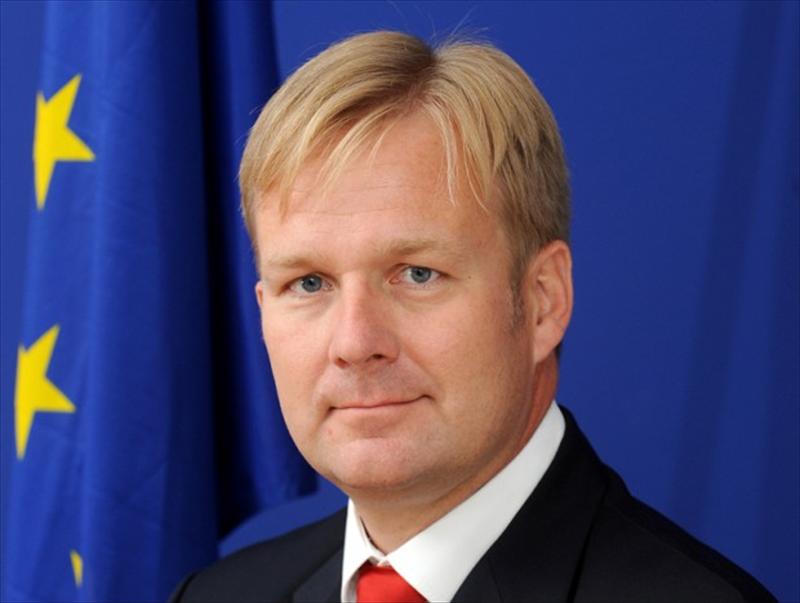Interview to Nezavisne novine
The European Union does not care if the solution to the Sejdic-Finci issue would be symmetrical or asymmetrical, it needs to see if discrimination will be eliminated, said Peter Sorense, EU Special Representative in BiH.
‘A symmetrical solution, asymmetrical solution and so on – these are only labels. Labels that are being attached are the biggest challenge that we are facing in our efforts to implement this decision. First I have to see or, to put it correctly, lawyers have to see if the violation of human rights is eliminated or not’, Sorensen stated.
NN: In his address to the Parliamentary Assembly of the Council of Europe, the Commissioner Fule spoke about your ‘intensified engagement’ with local politicians. What does it actually mean? Does it mean sanctions?
SORENSEN: It means that the focus is on our presence that implies wide range of tools enabling us to fulfil the task that we are here for. However, the emphasis of his speech was actually related to Brussels wishing to focus our presence on a single issue in order to finally overcome this obstacle. Previously, I used to call this obstacle ‘a stone in the shoe’. This description is probably not the most appropriate since everything else is ready. Yet, the Sejdic-Finci issue must be resolved, since every individual must have equal rights.
NN: Where is the fine line between ‘forcing’ our politicians to resolve the issue and letting them do it alone? It is evident that some ‘forcing’ is necessary, but if it would be too excessive, we would be at risk of disturbing the democratic process …
SORENSEN: To disturb the democratic process, not to seize responsibility for the job from local politicians, or not to come in the position of doing the job that should have been done by the ones who were democratically elected by the citizens – there is that fine line, you are right. What we can do is to offer our experience that we can gather from both Brussels and Member States, by explaining how similar situations at some other places have been solved. The challenge is how to do it in this case – something that we have discussed so many times, by us in the international community, local stakeholders, politicians and ex politicians. There are so many red lines here and so many different opinions, and so much discussion about this issue that finding the solution became incredibly difficult, so difficult that one cannot see the forest for the trees. The challenge is to move the discussion in the direction where trees can be seen.
NN: Do you feel your counterparts truly seek to resolve the issue? Or do they just pretend to be doing so, but actually don’t?
SORENSEN: There isn’t a single argument to the opposite, save for me to claim that their efforts to resolve the issue are frank. And I’m not saying this just like that, for the sake of it, to please anyone. Through my and my staff’s communication with them, I have seen them put efforts into resolving the issue. Of course, it is not the same as saying that the issue will be resolved. Bu the communication we have is frank and clear.
NN: What I mean is the next: the EU literally forced Croatia and Serbia to deal with the organised crime and corruption. Organised crime and corruption do not exist without at least some kind of connection with one part of politicians. It seems logical to me that some politicians in BiH do now wish to advance towards the EU in order not to jeopardise themselves…
SORENSEN: You are right in stating that moving towards the EU very much implies the resolution of the corruption issue. It will be the same with BiH. I think that slowly there is a regional trend to deal with that issue, so that I think that, regardless of whether BiH moves towards the EU or not, this will be the ongoing trend also in BiH. I am pretty sure that it will be like that. When you deal with corruption, you directly deal with the judiciary. And this is the sector that demonstrates the movement towards the EU, this is where we assist. Because when you are in a situation to have properly functioning judiciary, it makes things harder for corruption. That is why we insist so much on justice reform. You need to eliminate corruption if you want investors to come. The main condition is that you do not need to use bribe in order to live normally. The motive that I see with your politicians is that they realise that there is more prosperous or at least potentially prosperous future if BiH advances towards the EU. That is why I believe that their efforts in moving towards the EU are really honest. If some of them show certain dose of reservations, reasons for that lie some 15 to 20 years in the past. They feel the obligation to defend such positions. However, I think that they realised in the meantime that we need to have a constitutional system that respects and implements court rulings. It brings us back to the issue of the rule of law and legal state.
NN: Can you clearly and explicitly say: ‘If you do not solve the Sejdic – Finci issue by yourself, you will remain alone and nobody will do it for you’?
SORENSEN: Simple and clear: you must solve the Sejdic-Finci issue. Full stop.
NN: As you said, 2014 elections will not be recognised unless…
SORENSEN: You have a problem with the European Court for Human Rights, who told you that you had a problem of respecting human rights in the way elections are conducted. We do not need a legal expert to explain us what it means if the problem is not resolved.
NN: Would the famous asymmetric solution be acceptable for the EU?
SORENSEN: We need to see a concrete solution. If the solution eliminates discrimination, and the court ruling is implemented in that way, it will be acceptable. Naturally, the opinion of the Council of Europe will be crucial. Symmetric solution, asymmetric solution and so on – these are only labels. Labels that are being attached are the biggest challenge that we are facing in our efforts to implement this decision. There are so many cemented labels that do not even describe the very essence of the court ruling. That is why I cannot provide a definite answer to your question. First I have to see or, to put it correctly, lawyers have to see if the violation of human rights is eliminated or not. If the answer is ‘yes’, then my answer is affirmative too.
NN: In fulfilling the conditions of visa liberalisation, people perceived concrete benefit and actuall ‘pressed’ politicians to make a big and difficult job in a very short time, so that they now enjoy visa-free travel. I am afraid that when it comes to the EU, people do not feel what kind of concrete advantages they are going to get by moving towards the EU…
SORENSEN: The best way to get an impression is to talk to the countries that have recently become members. I can give you an insight what it means in terms of financial benefits, possibilities for education. The problem is that the benefits cannot be perceived at once. In this situation you cannot make a switch that you turn on and off to solve the problem, as was the case with the visa liberalisation, the benefits of which could be felt immediately. So, the best way to get an impression is to see what happens in the region. Generally, young people will have better possibilities, many things will get opened for them at once. Labour markets will get more liberal, population will achieve greater mobility, etc. Once you are a member of the EU, this is something that is implied. You do not think about it anymore. And that is what is expecting you. The European integration is a long lasting process. Wide consensus within the country is very important for the success of it. It is not enough to have political coalition that repeats that the European integration is the priority. The whole society must stand behind it. And when you look at the numbers in BiH, the consensus of the society exists. That is important. Actually, that is the most important. From my reports, the member states know that the BiH people want to join the EU.
NN: And all three peoples in BiH, the EU is one of the rare things that all agree on…
SORENSEN: There are many things you do not agree on. That is normal. One part of the population wants one thing, the other part wants another. That happens in any Member State. But BiH is a potential candidate for EU membership with the highest level of commitment towards the EU. That is very good news.
Source: Nezavisne novine




